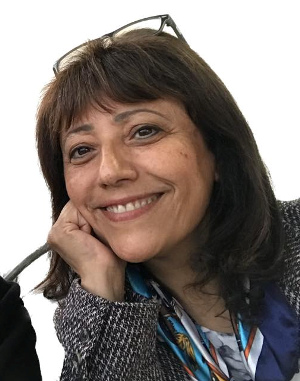
It is with great sorrow, that I have to report the untimely death of my friend and comrade, Maisoon Assadi.
Maisoon was born to a large family in the Arab village of Dir El Assad, in Galilee. As a young girl, she was sent to live with her widowed grandmother. The discriminatory policies of the Israeli Authorities meant that her village was not connected to the electrical network until many years later. So after nightfall, there was no real light, and no TV. Villagers would entertain themselves in the evenings by telling folk stories. And Maisoon learned the traditional folk stories from her grandmother, as well as the art of storytelling – skills that would serve her well in later life.
Maisoon studied social work at Haifa University, but upon graduating was not prepared to submit to the village expectation that a woman should return to the family home, and marry at a young age. Instead, she volunteered for Interns for Peace and then worked as a social worker in the deprived neighbourhoods of Jaffa. As an Arab living in the Jewish areas of Bat Yam and Tel Aviv, where Arabs were not welcome, she was compelled to hide her identity, refrain from speaking Arabic where she could be overheard by neighbours, and disguise her Arabic accent when speaking Hebrew.
Maisoon was always a fearless fighter, who raged against the oppression of the Palestinians by the Israeli State, and against her own oppression as a woman in the patriarchal society of the Arab village. She came across the CWI in the late 1980s, and played a key role in building Poalim Yahad, its supporting group in Israel/Palestine She would translate leaflets into both Hebrew and Arabic, and write articles for the Hebrew language paper, Poalim Yahad, as well as for the Arabic paper, Muajajha.
Maisoon was an active member of the CWI internationally and attended a number of CWI schools in Belgium. She was interviewed by the Militant in the 1990s, and the interview was published as a centre page spread under the heading, “I must struggle, this is my home”.
In 1993 Maisoon married Osama Masri, an actor, comedian, and playwright, who also worked as cultural editor of the CP daily, Al Ittehad. Together they had two children, Saphir and Mysam. Maisoon worked for the inclusion of deaf schoolchildren in the AKIM organisation. In later years, she began publishing folk stories using the story-telling skills she had learned from her grandmother many years earlier. Mainsoon published dozens of books and was often invited to speak at schools, where she brought a love of Palestinian folklore to a new generation. She won numerous literary awards, including the “Al-Awda” award for children’s stories, in 2008, for the story “Byout House”, an honorary award for the journalistic story on the topic “The Right of Return”, in 2010, for her story “A Load of Hope,” and the Arab Academic College Award for Education 2016.
Passionate about fighting injustice
Although no longer active in the CWI, Maisoon always considered herself a supporter. In 2019, she was one of those from the area who sent fraternal greetings to the re-founding conference of the CWI. In May 2021, an interview with Maisoon about the rising conflict between Jews and Arabs in Haifa was published in the Socialist newspaper (CWI England & Wales). She would regularly discuss political developments with me and would read draft articles and leaflets, providing valuable feedback.
She was passionate about fighting injustice but was also warm and welcoming on a personal level. Whenever we visited her home, she’d prepare a huge feast, and she always looked out for people less fortunate, too. An elderly neighbour, who lived alone in an upstairs flat, was always welcome at the family dinner table.
The CWI sends its deepest condolences to Maisoon’s husband, Osama Masri, and sons, Safir and Maysam.
Maisoon’s tragically early death at the age of 59 leaves a painful void in all who knew her. But she lived every minute to the full – working, political campaigning, writing books, visiting schools, hosting family and friends, and caring for others. In her short life, she played a key role in laying the foundations for Marxism in Israel/Palestine. We can best honour her memory by completing this task.
Special financial appeal to all readers of socialistworld.net |
Support building alternative socialist media Socialistworld.net provides a unique analysis and perspective of world events. Socialistworld.net also plays a crucial role in building the struggle for socialism across all continents. Capitalism has failed! Assist us to build the fight-back and prepare for the stormy period of class struggles ahead. Please make a donation to help us reach more readers and to widen our socialist campaigning work across the world. |
Donate via Paypal |
| M | T | W | T | F | S | S |
|---|---|---|---|---|---|---|
| 1 | 2 | 3 | 4 | |||
| 5 | 6 | 7 | 8 | 9 | 10 | 11 |
| 12 | 13 | 14 | 15 | 16 | 17 | 18 |
| 19 | 20 | 21 | 22 | 23 | 24 | 25 |
| 26 | 27 | 28 | 29 | 30 | ||

